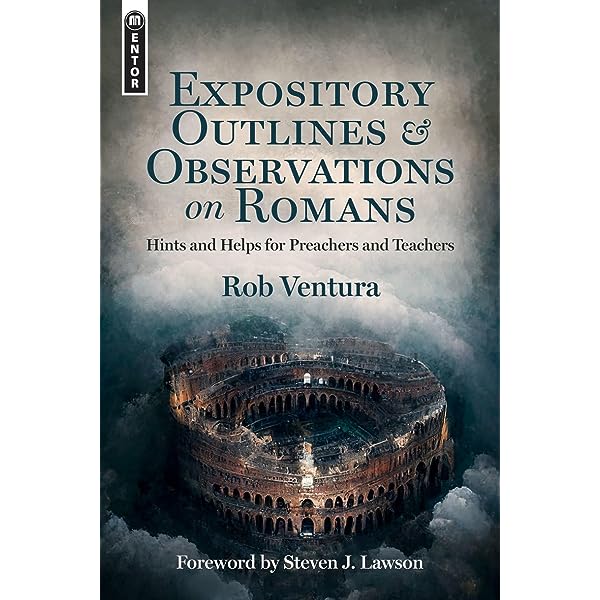If you’re preaching through the book of Romans and looking for a pool of solid historical resources, then Rob Ventura’s recently published Expository Outlines and Observations on Romans would be a welcome addition to your library.
Romans is one of the most-studied, most-written-about books in the New Testament, so there’s no shortage of helpful commentaries on the magisterial epistle. Schreiner’s academic volume in the Baker series, C. E. B. Cranfield’s technical standby, Douglas Moo’s triumphant explanations in the NICNT, John Murray’s recently republished theological observations, and on the list goes. What Ventura’s expositional commentary from Mentor adds to this heavyweight lineup is the collation of some of the most insightful voices in church history alongside his own exegetical notes that informed his preaching through Romans. If you’re looking for a commentary from which to mine Luther and Puritan quotes on the passage in Romans that you’re preaching, or if you’re looking to find a Reformed take on any given passage in Romans, Expository Outlines is the book to get.
The format of Ventura’s commentary organically grows out of a pastor’s study of a text (Ventura pastors at Grace Community Baptist Church in North Providence, Rhode Island). The pericopes that subdivide each section are homiletical rather than exegetical, meaning that you’ll get a whole chapter on Romans 1:1 (a la Martyn Lloyd-Jones) instead of a page or two. Each section begins with a general theme for the text, a suggested preaching outline for the text, a summary of the section, followed by Ventura’s exegetical notes, and some ideas for thinking through the application of the text.
The exegetical section reads like other Reformed expositional commentaries on Romans (MacArthur, Boice) and follows suit in its exegetical conclusions. In Ventura’s work, you’ll find theological and textual explanations for total depravity (Romans 3), sola fide (Romans 4), federal headship (Romans 5), election (Romans 9), and so on. I found Ventura’s footnotes on Romans 7 particularly useful as a help in articulating the position that Paul discusses Christian sanctification in verses 14 onwards. Ventura often deals with weighty exegetical debates in the footnotes, which are worth their weight in gold. While I may differ with Ventura on some of his conclusions in Romans 11 regarding national Israel, his exegesis throughout the commentary is well-read, astute, and worth consideration in the study of the text.
Practically speaking, one of the most helpful aspects of Ventura’s commentary was his extensive quotation of historical voices on the text and theology of Romans. It’s common to find, especially in the middle chapters, a page-long quotation from John Murray or a useful aphorism from Augustine. From Rutherford to Bullinger to Edwards, Ventura has collected the wisdom of some of the greatest minds throughout the history of the church to make sense of one of the greatest letters to the church. His notes are like a museum of great Romans commentators, like a greatest hits album on Romans from church history. If you are at that point in your sermon prep where you’ve worked through the exegetical issues and are looking for some help articulating your point with clarity and force, Ventura has compiled the resources for you.
A pastor’s study time must be well-managed, and Ventura has produced a volume that will well-serve pastors by saving them time in tracking down historical resources on Romans. While his own exegetical notes stand as helpful guides to the text, I’m sure Ventura himself would say that he’s not articulating anything new. Ventura’s work is a homiletical treasure chest for any pastor preaching through Romans and worth adding to your stable of Reformed commentaries on Paul’s longest and greatest letter.
A copy of the text of this commentary was provided for me by the author.


